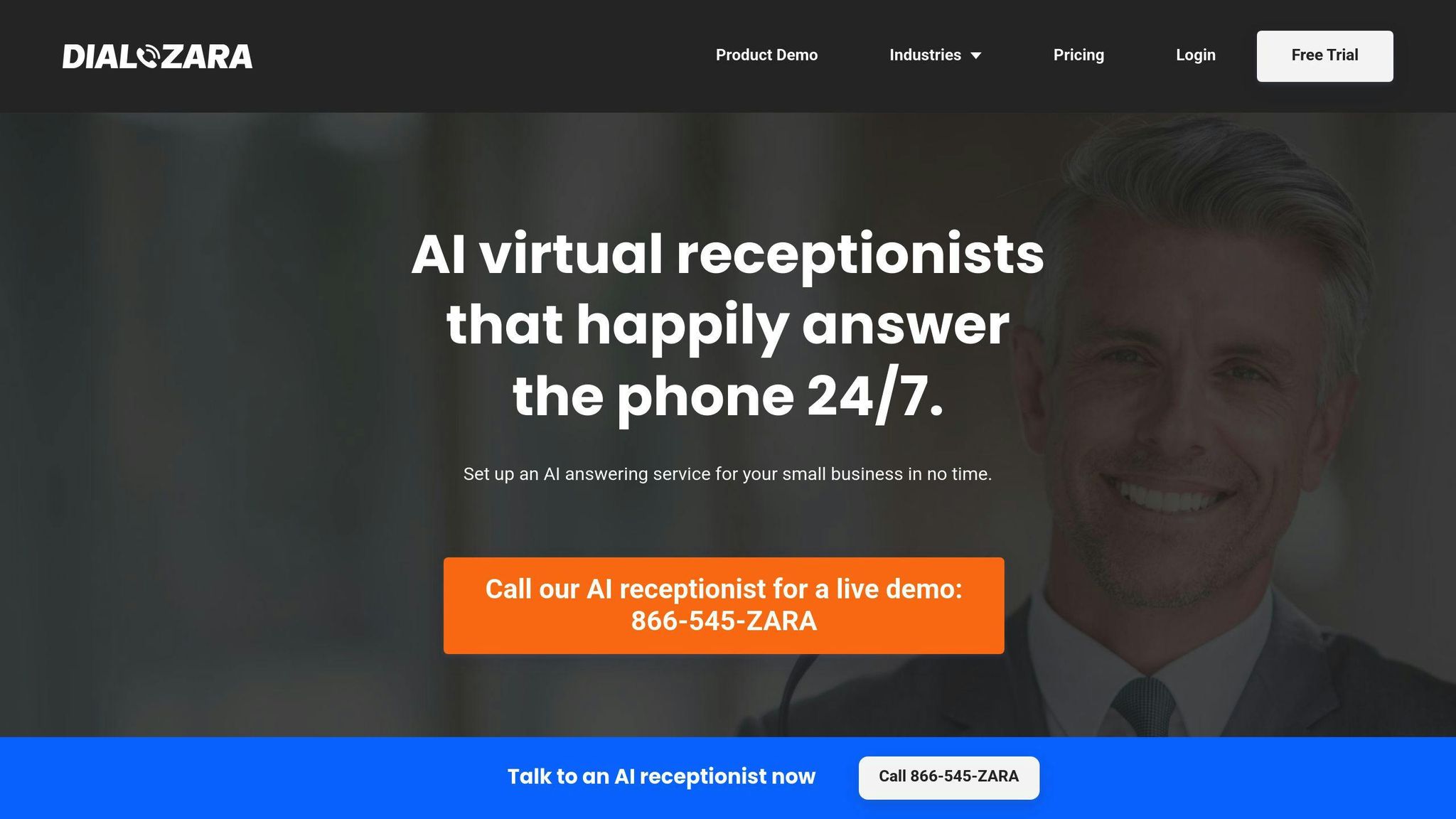
AI-Powered Customer Service: Cost Breakdown
Cut customer service costs by up to 90% with AI automation while improving response times and handling volume spikes without hiring.

Written by
Adam Stewart
Key Points
- Save $30,000+ annually compared to hiring full-time support staff
- Handle unlimited calls 24/7 without overtime or staffing costs
- Set up AI customer service in hours, not months
- Scale support instantly during busy periods without extra expenses
AI-powered customer service can drastically cut costs while improving efficiency. Businesses save on labor, operational hours, and scaling by using tools like chatbots and virtual assistants. Here's a quick overview of the key insights:
- Cost Savings: AI reduces labor costs by up to 90% by automating routine tasks like answering FAQs and tracking orders.
- 24/7 Availability: AI tools provide round-the-clock support without overtime expenses.
- Affordable Solutions: Third-party AI software costs range from $0 to $40,000 annually, far less than maintaining a full support team.
- Scalability: AI handles high inquiry volumes without extra hires, making it ideal for peak times.
Platforms like Dialzara showcase how businesses can integrate AI quickly, cut costs, and improve customer service. Read on to learn more about implementation, benefits, and cost comparisons.
Labor Cost Reduction through AI
Automation of Routine Tasks
AI helps cut labor costs by taking over repetitive tasks like resetting passwords, tracking orders, and answering basic questions. These tasks no longer require human agents, allowing businesses to operate more efficiently. With AI handling the simpler stuff, human agents can focus on more complex and impactful work. This shift not only reduces staffing needs but also makes operations leaner and more cost-effective.
Managing High Volumes Without Extra Costs
Traditional customer service models often require more staff to handle higher volumes of inquiries. AI changes the game by managing these increases without adding to labor costs. Here's how:
- AI can handle more inquiries without the need for extra hires.
- It provides round-the-clock support without overtime expenses.
- It scales effortlessly during peak times, eliminating the need for temporary staff.
- A single setup is sufficient - no ongoing training required.
Platforms like Dialzara illustrate how businesses can achieve these savings effectively.
Example: Dialzara

Dialzara offers an AI-driven phone answering service that slashes labor costs by up to 90%. This includes savings on salaries, training, and HR-related expenses, all while delivering 24/7 professional service. By replacing traditional staffing models with AI, businesses not only cut costs but also streamline their operations.
"AI-powered customer service solutions can be quickly set up and integrated with existing systems, making it easy for businesses to start reducing labor costs while maintaining high-quality customer support around the clock."
In addition to saving money, AI ensures businesses are always available to their customers and provides smoother, more efficient interactions.
Additional Advantages of AI in Customer Service
Around-the-Clock Support
AI-driven customer service ensures 24/7 availability, making it perfect for businesses with global customers or varying schedules. Tools like Dialzara make sure no call goes unanswered, even during holidays or late-night hours. Beyond just being available, AI delivers a more engaging experience by offering personalized, context-aware interactions.
Personalized Customer Experiences
AI takes customer interactions to the next level by analyzing past behavior, preferences, and even industry-specific terms. This means customers get relevant and professional support tailored to their needs. For example, Dialzara's AI agents can handle specialized jargon across different industries, ensuring every conversation feels professional and contextually accurate.
Faster Response Times
Speed matters in customer service, and AI excels at delivering quick responses. These systems can manage multiple inquiries at once, cutting down wait times and improving satisfaction. Routine questions are automated, saving businesses time and resources while lowering costs.
"AI provides immediate answers and quick solutions by automating routine inquiries and offering instant support. This reduces customer wait times and increases satisfaction, as customers receive timely and efficient service."
sbb-itb-ef0082b
Steps to Implement AI in Your Business
Easy Setup and System Integration
Getting started with AI-powered customer service begins by choosing a platform that works well with your existing tools, like CRM systems. Today’s AI solutions are built to integrate smoothly, keeping disruptions to a minimum. The process typically includes:
- System Assessment: Look at your current tools and figure out what integrations are needed.
- Platform Selection: Pick an AI platform that matches your specific needs.
- Integration Setup: Connect the platform and set up workflows.
Training AI Agents
Training AI agents is all about teaching them your business’s language, rules, and communication style. This ensures they provide accurate and personalized support. Instead of complicated programming, businesses now answer targeted questions about their operations, making training much simpler. Well-trained AI agents can handle tasks effectively, helping you maintain service quality without needing extra staff.
Deployment and Scaling
When it’s time to deploy, AI agents can start managing customer interactions almost immediately. Scaling is just as simple - AI tools adjust based on customer feedback, take on more responsibilities, and handle busy periods with ease. This allows businesses to keep service levels high while cutting down on costs.
"AI tools can analyze customer call patterns to predict peak volumes and optimize staffing accordingly, ensuring businesses can scale their customer service operations efficiently while maintaining quality standards."
Conclusion: Impact of AI on Costs and Operations
Key Advantages
AI-driven customer service has reshaped how businesses interact with customers while significantly lowering expenses. By offering faster response times and 24/7 availability, AI tools not only reduce service costs but also improve customer satisfaction. These solutions address staffing challenges and make high-quality customer service accessible to small and medium-sized businesses at a fraction of traditional costs. For instance, third-party AI software can cost anywhere from $0 to $40,000 annually - far less than maintaining a large support team.
As more companies embrace AI, its role extends beyond cutting costs, offering opportunities for long-term growth and improved service models.
The Road Ahead for AI in Customer Service
AI's role in customer service is evolving quickly, enabling systems to handle more complex and context-aware interactions. This progress helps smaller businesses compete with larger competitors by leveling the playing field.
"AI can analyze customer interactions to identify patterns and trends, allowing businesses to tailor their services and products more effectively. This data-driven approach can lead to better decision-making and more targeted marketing campaigns."
FAQs
What are included in customer service costs?
Labor costs make up a big part of customer service expenses. Let’s break down these costs and see how AI can help cut them down.
Traditional customer service costs cover labor, training, infrastructure, and administrative tasks. Here’s how these components stack up:
| Cost Component | Description |
|---|---|
| Labor Costs | Salaries, benefits, and overtime pay |
| Training | Onboarding new hires and ongoing skill updates |
| Infrastructure | IT systems, phone setups, and workstations |
| Administrative | HR tasks, scheduling, and compliance efforts |
| Operational | Quality checks and performance tracking |
AI-powered tools offer a cheaper alternative to traditional setups. For example, third-party AI software can cost anywhere from $0 to $40,000 annually. Tools like Dialzara automate tasks like phone answering and customer interactions, cutting labor costs by up to 90%.
"AI-driven predictive analytics helps businesses forecast call volumes based on historical data, allowing for more accurate staffing and resource allocation. This reduces overtime costs and ensures agents are available when needed, leading to a more balanced workload and better resource utilization."
AI forecasting tools are game-changers. They predict call volumes, minimize overtime costs, and balance workloads. Basic AI solutions start at around $2,000, while advanced systems can go up to $50,000, offering a range of automation features. By tackling these cost areas, AI makes customer service more efficient and affordable.
Summarize with AI
Related Posts
24/7 Customer Support with AI Chatbots
Discover how AI chatbots provide 24/7 customer support, offering instant responses, cost savings, and personalized service to improve customer satisfaction.
How Conversational AI Improves Customer Service
Explore how conversational AI revolutionizes customer service by automating queries and providing 24/7 support, reducing costs and improving satisfaction.
How AI Reduces Costs for Small Businesses
Discover how AI-powered customer service can cut costs and improve efficiency for small businesses, ensuring a competitive edge and customer satisfaction.
5 Customer Service KPIs AI Improves
Discover how AI enhances customer service efficiency by improving key KPIs like response times, issue resolution, and cost management for superior customer experiences.
